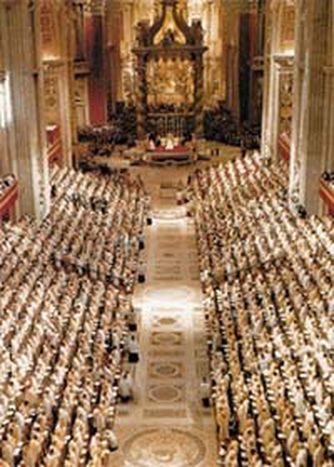
An ecumenical and diplomatic Pope
Published on
Translation by:
 sally harbinson
sally harbinson
Communication between religions is rather like foreign diplomacy, but with two exceptions: the rivalries concern the differences in interpretation of faith and the debates are founded on 2000 years of history.
Three words recently spoken by Benedict XVI give us an idea of the relationships that Christianity will have with other religions under his rule as pontiff: communication, evangelism and education. Even though these three concepts are quite different, they remain intertwined when we look into the links between religions.
Communication
Communication between religions requires careful diplomacy. Rabbi David Rosen, a key figure in the relationship between Israel and the Vatican, knows Benedict XVI personally and announced in the Hebrew newspaper Haaretz that the new Pope "has a profound commitment to good relations between the Catholic Church and the Jewish people, and an unquestionable commitment to Israel's well-being. From a narrow Jewish and Israeli perspective, [his appointment] is good news for the Jews."
Likewise, during his inaugural mass, the new Pope announced: “I appreciate the progress that has been made by the talks between Muslims and Christians, both on a local and international scale”. And, as he pointed out, Islam is as much a force in Europe as it is internationally as a major religion. Following on from that, Dalil Boubakeur, rector of the Paris mosque stated: “I hope that the new Pope will forgo Cardinal Ratzinger’s conservatism in favour of a highly spiritual, highly open vision, which will go beyond the dogma and doctrine of the old regime”.
These messages from representatives of the other two main monotheist religions prove their diplomatic skills. The presence of Jewish and Muslim leaders at the enthronement of the new Pope bears witness to the fact that, since the reforming Second Vatican Council, the three monotheistic religions have an almost “spiritual relationship”. They communicate freely and are able to meet to discuss matters peacefully.
Evangelism
The pontificate of Benedict XVI will be ruled in the spirit of evangelism. But where as evangelising, or re-evangelising, is not a problem if you do it on your own doorstep, problems arise when you try to evangelise elsewhere. Father Charles, an Irishman from Londonderry and former pastor of a small Catholic community in Russia, is very cautious in the way he deals with members of the Patriarch of Moscow’s congregation. The few members of the flock who come to him in search of a new spirituality are at first sent back to his Orthodox counterpart and are only welcomed into the Catholic community when they have shown that they are truly dedicated.
The rivalry which divides Eastern and Western Christianity and which caused the 1054 split between Churches, is especially relevant today due to a tug-of-war of influence which is developing in Europe. Two methods are being considered: the individual conversion of the faithful and the conquest of entire communities. So, is it a question of ecumenism or proselytising? For about 10 years, Patriarch Alexis II of Moscow and all Russia has readily accused the Vatican of “desperately trying to convert people”. These remarks could be scaled down as the Catholic Church cannot exactly advertise, as the Mormons do in the streets of Moscow or Jerusalem. Recently, Patriarch Alexis II has told the new Pope: “I really hope that your Holiness’ pontificate will be remembered for the development of good relationships between our churches, and fruitful talks between Orthodox Christians and Catholics”.
Education
How can the Holy See become closer to its neighbours? By producing a papal brief in favour of abortion or contraception? The role of the church is to educate people according its own morals and it is not up to public opinion to change this ethic and adapt it to suit theirs. It is not simply a question of being liberal or conservative. Let’s not forget that the differences between religions are mainly concerned with the way faith is interpreted. It is necessary to rediscover the links that unite the Catholic Church with other religions and Christian denominations. Emphasis must be placed on spirituality rather than on the dogma and doctrines of the Church in Rome, even if this means making certain concessions. The newly appointed Pope recently made a significant step forward in this direction by confirming that his method of teaching did not oppose freedom of thought.
Translated from Pape oecuménique, Pape diplomatique


